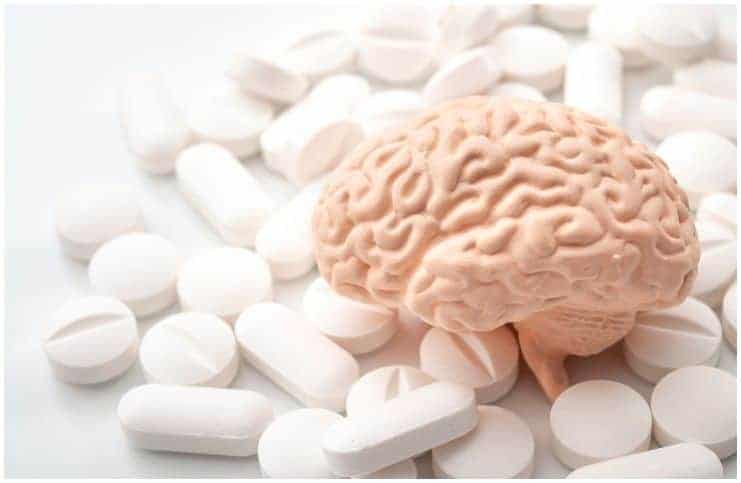Melatonin (MEL)
It is a hormone produced by the pineal gland, a small gland in the brain. This is a pea-sized gland that is located just above the middle of the brain.
The amount of light that you are exposed to each day influences how much MEL the pineal gland produces and it affects your body’s internal clock (also referred to as circadian rhythm). The circadian rhythm is an internal 24-hour “clock” which has an essential role in when we wake up and when we fall asleep.
Typically, the production of MEL is reduced by being exposed to bright light, however, its levels increase at night. This is the reason it is frequently called ”the hormone of darkness.”
Once released, MEL binds to hormonal receptors located in the brain’s suprachiasmatic nuclei (a region of the brain in the hypothalamus, situated above the optic chiasm) and travels into the cerebrospinal fluid (a colorless liquid which surrounds and fills the spinal cord and the brain) and the bloodstream.
Furthermore, this hormone is currently being investigated for its role in fighting breast cancer as it has a few anti-cancer properties.
The human body naturally produces it, nevertheless, consuming foods and beverages which contain caffeine, as well as tobacco and alcohol use, can all considerably lower MEL levels in the body.
Also, blood pressure-lowering prescription medicines, like – calcium channel blockers and beta-blockers, may notably lower the human body’s natural production of MEL. Also, the natural levels of this hormone slowly drop with age, and due to various reasons, some older adults make none at all.
However, MEL can be produced synthetically and, in the United States, it is available without a prescription as an over-the-counter dietary supplement.
As a medicine, MEL dietary supplements have been researched for sleep disorders, like – disruptions of the body’s internal “clock,” jet lag, problems with sleep among people who work night shifts, and is also used for the treatment of insomnia. In time, this can lead to depression. For the treatment of depression, some of the best methods are mindfulness meditation, exercise, and online counseling (like – BetterHelp.com).
Moreover, this hormone is used medically in a variety of conditions, such as – Alzheimer’s disease, radiation exposure, and tinnitus (ringing in the ears). Also, despite numerous claims which have been made in newspapers and magazines, no scientific studies have shown that MEL dietary supplements can prolong your life or slow down the aging process.
It is frequently available in pill form, however, it is also available in forms which can be put under the tongue or in the cheek.
Side Effects
The side effects of consuming its synthetic version have not been extensively studied, plus, due to the fact that in the US it is classified as a “dietary supplement,” it is unregulated by the Food and Drug Administration. The most common reported side effects to include the following:
- short-lasting feelings of depression;
- daytime sleepiness;
- confusion ;
- headaches;
- irritability;
- dizziness;
- mild anxiety;
- abdominal discomfort;
- taking too much MEL dietary supplements can disrupt the circadian rhythms;
- interaction with various medications.
Note – the use of MEL dietary supplements derived from animal pineal tissue has a high risk of contamination. This means that it can transmit viral material.
Serotonin
It is a monoamine neurotransmitter that was first discovered in Rome in 1935 by Vittorio Erspamer (an Italian chemist and pharmacologist). In the late 1940s, American scientists corroborated his findings.
It is found mostly in the digestive system, however, it is also found throughout the central nervous system and in the blood platelets.
This hormone is involved in the regulation of a few processes within the human brain, like -mood, depression, aggression, emotions, appetite, sleep, memory, anxiety, and perceptions. In addition, it can trigger the release of some compounds in the blood vessels of the brain which, in turn, cause the pain of a migraine.
According to research, the levels of this hormone can have a notable effect on behavior and mood, plus, it is strongly associated with living longer.
Also, it may help regulate the activity of clotting factors and is released during blood clotting. More importantly, since its levels rise and fall as the body shifts between sleep and wakefulness, this hormone is involved in the regulation of circadian rhythms.
While this hormone is associated with mental well-being and brain function, interestingly, about 95 percent of this hormone is produced in the intestines. This is another reason to have a regular diet high in dietary fiber, which influences our healthy gut bacteria.
Regular nutrition lacking in tryptophan may cause people to have low levels of this hormone, which ultimately may lead to headaches, depression, and sleep disorders.
Foods high in tryptophan include – chia seeds, almonds, beets, pineapples, pinto beans, red kidney beans, sunflower seeds, sesame seeds, spinach, spirulina, lentils, navy beans, flax seeds, cashew nuts, kale, pistachio nuts, chickpeas, and hazelnuts.
Also, if you combine carbs with high-tryptophan foods, you might get another boost in this hormone.
Melatonin vs Serotonin – Differences
These two hormones perform opposite jobs in the human body, however, they must work in harmony to kick start the human body’s natural sleep cycle.
Image credit – Shutterstock
READ THIS NEXT: Norepinephrine vs Epinephrine
